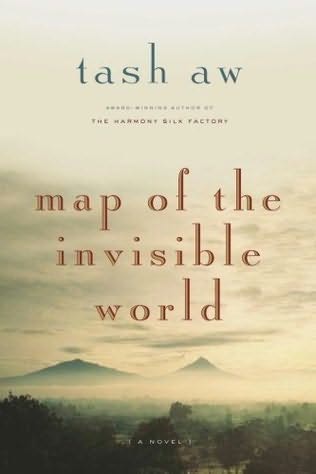
Sometimes, it's nice to have your expectations dashed. I started Tash Aw's second book after the Costa Award winning "Harmony Silk Factory" with the same trepidation I approach most tomes that come with the stamp of "literary work by an award winning author". The niggling anxiety that instead of a coherent plot I"m going to be bombarded instead with wordy digressions into philosophical ruminations, that instead of pace you get garrulous asides on 5 different ways to describe "sunlight slicing through tree leaves" or numerous variants on circumlocutory prose that fill up pages but don't advance the story one iota.
The anxiety in this case was heightened because Aw's debut novel, frankly speaking, bored me shitless.
Map Of The Invisible World though, surprised me with a pacy narrative, structured storyline and shockingly engaging plot that to put it bluntly, has me worried that it may not earn the plaudits reserved for books you DON'T take on an 8 hour flight.
After all it resolutely avoids an overtly depressing tone, has the audacity to bring it's myriad plot threads to a fitting conclusion, the gall to wrap up (most) of it's loose ends, and in an act of almost suicidal bravery, dares to end on a happy note. If this isn't Aw's symbolic "Fuck You" to the Booker, Orange, Whitbread or Costa Committee, I don't know what is.
Set amidst a turbulent Indonesia of the '60s, fueled by President Sukarno's purges of Western influences, communist unrest and the country's infamous Confrontation with neighbouring Malaysia, Map tells the tale of orphan Adam, who leaves his small island of Nusa Perdo for Jakarta when his Dutch step-father, painter Karl de Willigen, is taken away by the Army for possible forced repatriation back to Holland. Guided only by a photo taken of his step-father and an American lady, Adam goes in search of her to help locate Karl.
The lady in question, Margaret Bates, Indonesian born with an uncanny knack of blending in and understanding the local mindset, has a past with Karl, and takes an immediate liking and attachment to Adam. So, unfortunately does ultra-radical Din, Margaret's teaching assistant who sees in Adam's naivete and innocence, the perfect tool to execute a dangerous plot to topple the Government.....
And all the while, in Kuala Lumpur, Johan, an Indonesian boy adopted into a wealthy and connected Malaysian family, wrestles with guilt at what he perceives to be an abandonment of his younger sibling many years ago in an orphanage.....
Aw's resort to that hoariest of cliches by now, the Chronological Juggling of sub-plots, thankfully doesn't detract from the pleasure of reading this breezily executed tale of love, loss and guilt.
And Aw's occassional concession to the "I read for the writing" crowd via descriptions of a windowpane shattering over a boy's head as " it had exploded into a million tiny shards that refracted the sunlight-balls of brilliant colour that exploded into existence for a second, like those magical bursts of fireworks that light up for a moment before suddenly disappearing, leaving you staring at nothingness" and the closing of shutters as "light framing the window in thin strips" are brief enough to not trigger my usual gag reflex at such prose-wanking shit.
Map's biggest casualty are it's characters who function as mere plot-drivers and rarely break out of their pre-fab specs: The feisty White Woman, the gutsy and beautiful Indonesian Lass, the shifty CIA spook, the good if weak Gay Journalist, the spineless orphan and evil radical. Even Sukarno, who briefly cameos, comes across as a decadent Autocrat who despises all things Western while seemingly unable to live without it's trappings, which however, I concede, could very well be a spot-on observation of this fascinating Despot.
If anything, Map's most interesting character, guilt-wracked Johan has the misfortune to occupy the book's most superfluous and throw away chapters. The entire KL bound narrative could have been safely excised without interrupting the story and could have actually resulted in an even more taut and disciplined narrative.
But these minor gripes aside, Map is an engaging read you could breeze through in a hazy weekend better spent indoors.
Hell, I'd take it on an 8 hour flight.

No comments:
Post a Comment